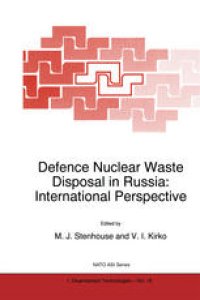
Ebook: Defence Nuclear Waste Disposal in Russia: International Perspective
- Tags: Nuclear Chemistry, Waste Management/Waste Technology, Environmental Management, Environment general, Physical Chemistry, Earth Sciences general
- Series: NATO ASI Series 18
- Year: 1998
- Publisher: Springer Netherlands
- Edition: 1
- Language: English
- pdf
Significant amounts of liquid and solid radioactive waste have been generated in Russia during the production of nuclear weapons, and there is an urgent need to find suitable ways to manage these wastes in a way that protects both the current population and future generations. This book contains contributions from pure and applied scientists and other representatives from Europe, North America, and Russia, who are, or have been, actively involved in the field of radioactive waste management and disposal. First-hand experience of specific problems associated with defence-related wastes in the USA and the Russian Federation is presented, and current plans are described for the disposal of solid wastes arising from civilian nuclear power production programmes in other countries, including Belgium, Bulgaria, Canada, Germany and the UK.
The book provides a good insight into ongoing research at local and national level within Russia, devoted to the safe disposal of defence-related radioactive waste. It also demonstrates how existing expertise and technology from civilian nuclear waste management programmes can be applied to solving the problems created by nuclear defence programmes.
Contributions address methods of immobilisation, site selection methodology, site characterisation techniques and data interpretation, the key elements of safety/performance assessments of planned deep (geological) repositories for radioactive waste, and radionuclide transport modelling. Concerns associated with certain specific nuclear waste disposal concepts and repository sites are also presented.
Significant amounts of liquid and solid radioactive waste have been generated in Russia during the production of nuclear weapons, and there is an urgent need to find suitable ways to manage these wastes in a way that protects both the current population and future generations. This book contains contributions from pure and applied scientists and other representatives from Europe, North America, and Russia, who are, or have been, actively involved in the field of radioactive waste management and disposal. First-hand experience of specific problems associated with defence-related wastes in the USA and the Russian Federation is presented, and current plans are described for the disposal of solid wastes arising from civilian nuclear power production programmes in other countries, including Belgium, Bulgaria, Canada, Germany and the UK.
The book provides a good insight into ongoing research at local and national level within Russia, devoted to the safe disposal of defence-related radioactive waste. It also demonstrates how existing expertise and technology from civilian nuclear waste management programmes can be applied to solving the problems created by nuclear defence programmes.
Contributions address methods of immobilisation, site selection methodology, site characterisation techniques and data interpretation, the key elements of safety/performance assessments of planned deep (geological) repositories for radioactive waste, and radionuclide transport modelling. Concerns associated with certain specific nuclear waste disposal concepts and repository sites are also presented.